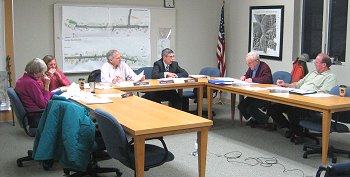- By Dan Veaner
- News
 Print
Print
"This is what the Mayor would call..." said Village of Lansing Trustee Lynn Leopold. And all the other trustees intoned in unison, "an unfunded mandate!"
They were talking about the storm water control and enforcement requirements that they and many municipalities around New york State have been struggling with for over a year. As the January 8, 2008 deadline for implementing local laws regulating storm water and erosion control, and storm water illicit discharges approaches, many municipalities are about to fall out of compliance with State regulations. That is likely to be the case for the Village, because they are just about to pass the first law, but have yet to move on the second. The Town of Lansing is in better shape, having passed its storm water law last year, and squeaking in just under the wire at next week's Town Board meeting with a public hearing on an illicit discharge law.

Kiley says the mandates originate with the federal government, but the greatest impact is on local governments. Larger municipalities may be able to absorb the costs of creating and enforcing the laws, but it is a significant burden for smaller ones like the Town and Village of Lansing. The two local governments have struggled to comply, but neither, especially the Village, has resources, and while the State requires action it is not helping pay for it.
Town Attorney Guy Krogh and Town Engineer David Herrick put together the laws for the Town. Town Environmental Planner Darby Kiley also worked on the illicit discharge law, tracking changes and working with Dryden's law as a model. Kiley says the Town's law applies to any pipe going into the Town's ditches, and that it includes discharges into Salmon Creek. Leopold and Village Code Enforcing Officer Ben Curtis have put together their storm water law, using the Dryden model as well.
Tompkins County's Water Resources Council worked on a version of the law they hoped all its municipalities would adopt, making the regulations uniform county-wide. But Kiley says it doesn't work for all the towns and villages, which have different needs from each other and the city of Ithaca.
"Our most useful model, aside from the state model, is Dryden's," Leopold says. "I'm sure there are places where our government works differently than Dryden, but they had really good help. The had both Debbie Gross and , Dan Kwasnowski working on their law. I was very impressed by the way it was presented and the work they've done. We're a small municipality. This is the big problem for all of us -- we're not the only ones."
It's a problem, because local officials and employees must wade through State regulations and language to figure out what they must comply with, then create language that actually does comply. They are held accountable to the State, which apparently certifies municipalities to enforce state mandates. "It's built in with the municipal permit cycle," Kiley says. "The permit is like a notice of intent, and our intent is to be a municipality that regulates storm water."
If that sounds confusing, it is because it is. The bottom line is that when municipalities don't comply they are subject to fines, and state monies for local projects are withheld. While it is unclear whether the Village will be subject to a fine for not meeting the deadline for their illicit discharge law, Kiley notes that they have plenty of company. "There are going to be so many towns that haven't passed their laws yet," she says.

Darby Kiley
Once the laws are passed the State requires enforcement of them, which will be an even greater financial burden on local tax money. Kiley and Building Inspector Lynn Day have already attended training on enforcement. The State requires that municipalities physically survey 20% of their territory per year. Kiley says this will fall to 'people on the street,' such as highway department workers. "They're out there," she says. "And they're in ditches half the time, too. That's how we'll probably work it."
That is a burden on the Town, but even more so for the village which only has three employees that could conceivably be involved in this activity, all of who already have their hands full. And it could also mean fines for residents. "The law lists noncompliance fees," Village Trustee John O'Neill noted at the last Trustees meeting. "Are we then storm water police? Do we go after and charge these residents fees?"
The laws are hefty. The Town's storm water law is 25 pages long, and the draft illicit discharge law another 15. The Village law has the same heft. ""This was huge," Leopold says. "This is probably one of the biggest laws we have adopted in my history on the board.
"These regulations, right or wrong, are intended to police an area that the government believes has not been policed properly for a long time," Dubow replied. "That's what underlies the creation of these new regulations, to have some thing at the local level that imposes upon the local government to enforce these regulations."
"There are certain exceptions written in," Kiley notes. "You can wash your car on your lawn, and that's OK. The fire department can do hydrant tests, and that's OK. Irrigation. There are things we can't prohibit people from doing. But one of the pieces of it does target fertilizer. If you dump a whole bag of fertilizer on one patch and it rains and it all dumps in you could be fined."
Some Lansing residents have already complained to town officials that the illicit discharge law is just a back door scheme to revive the defunct town sewer project. "It has absolutely nothing to do with sewer in any way," Kiley says categorically. "It has to do with water flowing through our ditches. If that happens to be contaminated water then we need to adjust that."
The law doesn't care where illicit discharges come from, whether it be a septic system, tanks of chemicals, or used auto oil into a ditch. "When it comes to septic systems, we took that all out of the draft of the law we are working on, because the County does all of that," Kiley adds.
Both Kiley and Dubow say that the illicit discharge law is not controversial, and that current local laws already cover much of what it says. "I don't think this is going to generate a lot of discourse, or a lot of dispute," Dubow says. It's not much different from what we're doing now."
But the burden of time, effort, and tax dollars will fall upon local governments and their residents. "It is onerous, there's no question about it," Leopold says.
----
v3i47
They were talking about the storm water control and enforcement requirements that they and many municipalities around New york State have been struggling with for over a year. As the January 8, 2008 deadline for implementing local laws regulating storm water and erosion control, and storm water illicit discharges approaches, many municipalities are about to fall out of compliance with State regulations. That is likely to be the case for the Village, because they are just about to pass the first law, but have yet to move on the second. The Town of Lansing is in better shape, having passed its storm water law last year, and squeaking in just under the wire at next week's Town Board meeting with a public hearing on an illicit discharge law.

Town Attorney Guy Krogh and Town Engineer David Herrick put together the laws for the Town. Town Environmental Planner Darby Kiley also worked on the illicit discharge law, tracking changes and working with Dryden's law as a model. Kiley says the Town's law applies to any pipe going into the Town's ditches, and that it includes discharges into Salmon Creek. Leopold and Village Code Enforcing Officer Ben Curtis have put together their storm water law, using the Dryden model as well.
 (Left to right)Trustee Lynn Leopold, Clerk/Treasurer Jodi Dake, Deputy Mayor Larry Fresinski, Attorney David Dubow, Trustees Frank Moore and John O'Neil |
Tompkins County's Water Resources Council worked on a version of the law they hoped all its municipalities would adopt, making the regulations uniform county-wide. But Kiley says it doesn't work for all the towns and villages, which have different needs from each other and the city of Ithaca.
"Our most useful model, aside from the state model, is Dryden's," Leopold says. "I'm sure there are places where our government works differently than Dryden, but they had really good help. The had both Debbie Gross and , Dan Kwasnowski working on their law. I was very impressed by the way it was presented and the work they've done. We're a small municipality. This is the big problem for all of us -- we're not the only ones."
It's a problem, because local officials and employees must wade through State regulations and language to figure out what they must comply with, then create language that actually does comply. They are held accountable to the State, which apparently certifies municipalities to enforce state mandates. "It's built in with the municipal permit cycle," Kiley says. "The permit is like a notice of intent, and our intent is to be a municipality that regulates storm water."
If that sounds confusing, it is because it is. The bottom line is that when municipalities don't comply they are subject to fines, and state monies for local projects are withheld. While it is unclear whether the Village will be subject to a fine for not meeting the deadline for their illicit discharge law, Kiley notes that they have plenty of company. "There are going to be so many towns that haven't passed their laws yet," she says.

Darby Kiley
Once the laws are passed the State requires enforcement of them, which will be an even greater financial burden on local tax money. Kiley and Building Inspector Lynn Day have already attended training on enforcement. The State requires that municipalities physically survey 20% of their territory per year. Kiley says this will fall to 'people on the street,' such as highway department workers. "They're out there," she says. "And they're in ditches half the time, too. That's how we'll probably work it."
That is a burden on the Town, but even more so for the village which only has three employees that could conceivably be involved in this activity, all of who already have their hands full. And it could also mean fines for residents. "The law lists noncompliance fees," Village Trustee John O'Neill noted at the last Trustees meeting. "Are we then storm water police? Do we go after and charge these residents fees?"
The laws are hefty. The Town's storm water law is 25 pages long, and the draft illicit discharge law another 15. The Village law has the same heft. ""This was huge," Leopold says. "This is probably one of the biggest laws we have adopted in my history on the board.
"These regulations, right or wrong, are intended to police an area that the government believes has not been policed properly for a long time," Dubow replied. "That's what underlies the creation of these new regulations, to have some thing at the local level that imposes upon the local government to enforce these regulations."
"There are certain exceptions written in," Kiley notes. "You can wash your car on your lawn, and that's OK. The fire department can do hydrant tests, and that's OK. Irrigation. There are things we can't prohibit people from doing. But one of the pieces of it does target fertilizer. If you dump a whole bag of fertilizer on one patch and it rains and it all dumps in you could be fined."
Some Lansing residents have already complained to town officials that the illicit discharge law is just a back door scheme to revive the defunct town sewer project. "It has absolutely nothing to do with sewer in any way," Kiley says categorically. "It has to do with water flowing through our ditches. If that happens to be contaminated water then we need to adjust that."
The law doesn't care where illicit discharges come from, whether it be a septic system, tanks of chemicals, or used auto oil into a ditch. "When it comes to septic systems, we took that all out of the draft of the law we are working on, because the County does all of that," Kiley adds.
Both Kiley and Dubow say that the illicit discharge law is not controversial, and that current local laws already cover much of what it says. "I don't think this is going to generate a lot of discourse, or a lot of dispute," Dubow says. It's not much different from what we're doing now."
But the burden of time, effort, and tax dollars will fall upon local governments and their residents. "It is onerous, there's no question about it," Leopold says.
----
v3i47



